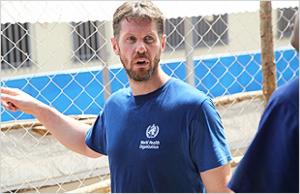Fighting Ebola from day one
Interview with Rob Fowler, a critical care physician from Canada, who worked in West Africa since the first confirmed cases of Ebola.
Getting the epidemiology right, contact tracing, social mobilization, infection prevention and control are what will play the biggest role in stopping the Ebola outbreak.
Dr Rob Fowler, a Canadian critical care physician, landed in Conakry, Guinea, the last week of March 2014, focussed and eager to get to work. He joined his WHO colleague Dr Tom Fletcher, an infectious diseases expert from the United Kingdom. Both had been recruited by WHO/Geneva to work with the WHO Pandemic and Epidemic Diseases clinical team, led by by Dr Nikki Shindo.
In Geneva, Rob and Tom shared office, and long before the onset of this outbreak, they had ruminated over the high mortality rate in Ebola outbreaks, and how a clinical response team focused on treating the syndrome of Ebola – dehydration, organ dysfunction and shock – might help to drive this mortality down. In the days that followed, Rob was to immerse himself in a WHO-established and MSF-run Ebola treatment centre to treat the Guinean capital’s first confirmed cases of Ebola.
Those first weeks were a continuous cycle of long hours of clinical care in the cobbled together Ebola Treatment Unit on the grounds of Donka Hospital, while simultaneously providing clinical advice at WHO Ebola response coordination meetings each morning.
While establishing effective coordination was clearly important, it was obvious that Rob wanted to return to the ever-growing number of patients as soon as possible. This has been a recurrent theme of the outbreak – an unprecedented, overwhelming and relentless ongoing need.
In late December 2014, he was on his 4th mission to West Africa. In a newly open treatment centre near Freetown, Sierra Leone, he was explaining to new staff how to put on and take off personal protective equipment (PPE). This is when he was interviewed.



